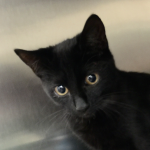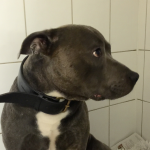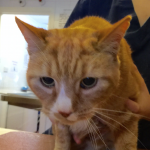News
Archive for the ‘Pet of the Month’ Category
Pet of the Month – July 2105
by admin on July 31st, 2015
Category: Pet of the Month, Tags:
Poppy is a lovely cat who suffers from the colon disorder called idiopathic (meaning the cause is unknown) megacolon. Constipation (infrequent or difficult defecation) is fairly common in cats. If it occurs only occasionally there’s usually not much to worry about. However, in some cats, constipation begins to occur more and more frequently, ultimately leading to obstipation: constipation that can’t be controlled by medical means. There are many potential causes of obstipation, but over half result from idiopathic megacolon.
As the name implies, the cause of idiopathic megacolon is unknown, but cats with mild or moderate forms (or perhaps those with early stages of the disease) often benefit from increased dietary fiber, administration of laxatives or stool softeners of various kinds, and drugs called prokinetic agents (like cisapride) that stimulate the muscles of the colon. As things progress, the occasional enema performed at a veterinary hospital may be necessary. Unfortunately, the need for enemas or other methods of removing feces from the colon becomes more and more frequent; ultimately, cats with advanced stages of the disease may simply stop responding to any medical therapy and the colon becomes little more than a big, flaccid bag containing a mass of hard feces.
Subtotal colectomy – surgically removing the major portion of the colon – is at that point really the only remaining option. This is major surgery, but the overwhelming majority of cats respond quite favourably. The most common postsurgical problem is diarrhea, but most cats begin to form stool of an acceptable quality within several weeks or less. Life returns to normal, or near normal, within several weeks. Though a subtotal colectomy is not necessarily a perfect solution, the majority of people whose cats have had one are quite pleased with the results. They continue to share life with a cat friend who, without the surgery, would not have survived.
We are very pleased to report that Poppy has been coping very well with more conservative treatments including laxatives, prokinetic agents and the occasional enema.
Pet of the Month – June 2015
by admin on June 30th, 2015
Category: Pet of the Month, Tags:
Monty is our pet of the month. He can be seen here having his painkiller ‘patch’ changed as part of his treatment for Pancreatitis.
Pancreatitis is an inflammation of the pancreas. Unlike dogs, cats with pancreatitis do not usually show vomiting or abdominal pain as their initial sign. In more than 50 percent of affected cats, lethargy, poor appetite or not eating, dehydration, increased respiratory rate, and a lower-than-normal body temperature are the initial signs. Only about 35 percent of the cats with pancreatitis will vomit.
Diagnosing pancreatitis can be problematic. Ultrasound is one of the best methods, and new blood tests are helpful.
All cats with pancreatitis will need extensive fluid therapy and careful monitoring of their electrolytes. If the cat is vomiting, food may need to be withheld, but ideally not for more than 48 hours and pain control is essential.
He was been a wonderful patient and we are delighted to report that he is now fully recovered.
Mizia
by admin on June 1st, 2015
Category: Pet of the Month, Tags:
Our pet of the month is Mizia, seen here recovering from a hysterectomy she urgently needed for pyometra.
Pyometra is an infection of the uterus (womb). It is a common condition in older female dogs that have not been speyed, but can occur in entire bitches of any age. Occasionally we see cases occurring in cats.
Each time a bitch has a season (usually about twice a year) she undergoes all the hormonal changes associated with pregnancy – whether she becomes pregnant or not. The changes in the uterus that occur with each season make infection more likely with age. A very common organism called E. coli, found in your dog’s faeces, usually causes the infection. We most commonly see cases of pyometra in the 4-6week period after a heat.
The symptoms usually develop around 6 weeks after the female has finished bleeding from her last season, but in some cases the bitch appears to have a prolonged season.
Early signs that you may notice are that your dog is:
- Licking her back end more than normal
- Off colour
- Off her food
- Drinking more than normal (and will probably urinate more)
These signs will progress and you may see:
- Pus (yellow/red/brown discharge) from her vulva
- She may have a swollen abdomen
- Vomiting
- Collapse
If left untreated signs will worsen to the point of dehydration, collapse and death from septic shock.
Pet of the Month – May 2015
by admin on May 1st, 2015
Category: Pet of the Month, Tags:
 We are delighted to report that handsome Harry continues to make good progress with his ongoing chemotherapy for lymphoma.
We are delighted to report that handsome Harry continues to make good progress with his ongoing chemotherapy for lymphoma.
Lymphoma (lymphosarcoma or non-Hodgkin’s lymphoma) is a malignant cancer that involves the lymphoid system. In a healthy dog, the lymphoid system is an important part of the body’s immune system defence against infectious agents such as viruses and bacteria. Lymphoid tissue normally is found in many different parts of the body including lymph nodes, liver, spleen, gastrointestinal tract and skin. Lymphosarcoma is classified according to the location in the body in which the cancer begins.
These include:
- Multicentric form occurs in the lymph nodes.
- Gastrointestinal form occurs in the stomach, intestines, liver and lymph nodes in the abdomen.
- Mediastinal form occurs in the mediastinum, in front of the heart in an organ called the thymus. Hence this form of lymphosarcoma sometimes is called thymic lymphoma.
- Cutaneous form occurs in the skin.
- Acute lymphoblastic leukemia occurs when the disease starts in the bone marrow.
- Miscellaneous forms of lymphosarcoma are less common and include those that begin in the nervous system, nasal cavity or kidneys.
While we understand how lymphomas form, we still do not understand why.
Chemotherapy treatment is considered the gold standard for this aggressive form of cancer and usually consists of a combination of oral and injectable drugs given on a frequent basis.
Pet of the Month – April 2015
by on April 2nd, 2015
Category: Pet of the Month, Tags:
 Our Pet of the Month for April is Alf, a handsome Burtonion Bulldog. As is often the case when puppies leave their mother and move to their first ‘home’ Alf suffered a bout of diarrhoea almost immediately.
Our Pet of the Month for April is Alf, a handsome Burtonion Bulldog. As is often the case when puppies leave their mother and move to their first ‘home’ Alf suffered a bout of diarrhoea almost immediately.
As with ourselves, simply providing plenty of fresh water, temporarily withholding food then reintroduction of small amounts of an easily digestible bland diet such as plain chicken and boiled rice or a little scrambled egg, is all that is required to provide some ‘gut rest’ and for the diarrhoea to settle. In cases where very plentiful diarrhoea occurs, especially if accompanied by vomiting, a more proactive approach may need to be taken and this may include temporary provision of oral or intravenous rehydrating solutions if dehydration is identified as a risk. There is very little indication for antibiotics to be given in most cases of short-term diarrhoea.Whilst there are many medical treatments which may act as ‘adsorbants’ purported to ‘soothe’ the gut, in many cases, just as in their human owners, dogs and cats with short bouts of diarrhoea require no treatment. Investigation as to a cause of acute diarrhoea in otherwise healthy cats and dogs is rarely undertaken since this is not only usually fruitless, but results in both unnecessary expense and, more importantly, potential for completely unnecessary medical tests to be performed on a pet.
The are numerous potential predisposing factors such as dietary change, internal parasites and the stress of moving home. We checked that his worming program was up to date and are pleased to report that Alf’s tummy has settled and he is doing very well.
Pet of the Month – March 2015
by on March 5th, 2015
Category: Pet of the Month, Tags:
 Ozzy, our pet of the month, is suffering from Dysautonomia an illness characterised by a malfunctioning of the autonomic nervous system (ANS), the system that controls the heart rate, respiration, digestion, urination, salivation, perspiration, eye pupil dilation, blood pressure, intestinal contractions, glandular activity, and physical arousal. The body functions that occur within the ANS are largely performed without conscious thought, with the exception of breathing, which works in coordination with conscious thought. This condition is also referred to as Key-Gaskell syndrome.
Ozzy, our pet of the month, is suffering from Dysautonomia an illness characterised by a malfunctioning of the autonomic nervous system (ANS), the system that controls the heart rate, respiration, digestion, urination, salivation, perspiration, eye pupil dilation, blood pressure, intestinal contractions, glandular activity, and physical arousal. The body functions that occur within the ANS are largely performed without conscious thought, with the exception of breathing, which works in coordination with conscious thought. This condition is also referred to as Key-Gaskell syndrome.
Ozzy presented with inappetance, dilated pupils, third eyelid protrusion and difficulty in urinating. He has a delightful nature and has been very stoic and good natured. He has just had to have a stomach (peg) tube fitted to supply his nutritional and medicinal needs as he is now no longer able to eat of his own volition.
This is a rare condition and the underlying cause is unknown. Treatment is based on treating the primary symptoms and the prognosis for recovery is guarded. Even with appropriate supportive care recovery can take several months.
Pet of the Month – February 2015
by on January 30th, 2015
Category: Pet of the Month, Tags:
 Poor kitty! Reggie was brought in as a stray, having been involved in a road traffic accident. Although he did not seem to have significant external injuries he began to deteriorate rapidly and internal injuries were suspected. Blood tests, radiology and ultrasound examination revealed a ruptured bladder.
Poor kitty! Reggie was brought in as a stray, having been involved in a road traffic accident. Although he did not seem to have significant external injuries he began to deteriorate rapidly and internal injuries were suspected. Blood tests, radiology and ultrasound examination revealed a ruptured bladder.
When surgery was performed his bladder was found to be badly torn and it was feared that a repair might not be effective. We are delighted to report that despite this his bladder healed quickly and completely and he has now been rehomed with one of our nurses!
Pet of the Month – January 2015
by on January 5th, 2015
Category: Pet of the Month, Tags:
 Handsome Doobey is seen here showing his best side as he reflects on the wisdom of eating the contents of his owners bin!
Handsome Doobey is seen here showing his best side as he reflects on the wisdom of eating the contents of his owners bin!
Doobey was violently sick and then went on to have a seizure and developed neurological symptoms, including head bobbing and twitching. This necessitated his admission for intravenous fluids to try and flush the unidentified toxins out of his system, and tranquilising medication to keep him calm. We are delighted to report that he is now back to his former bouncy self!
Pet of the Month – December 2014
by on December 3rd, 2014
Category: Pet of the Month, Tags:
 Niamh is a lovely Springer/Labrador cross with great owners. She presented in the summer with a history of vomiting and diarrhoea after possible ingestion of rhubarb.
Niamh is a lovely Springer/Labrador cross with great owners. She presented in the summer with a history of vomiting and diarrhoea after possible ingestion of rhubarb.
Pet of the Month November 2014
by on October 31st, 2014
Category: Pet of the Month, Tags:
 Poor Georgie soon came to regret eating a packet of yoghurt covered raisins. Grapes, raisins, currants and sultanas can cause renal failure in dogs and cats. Thankfully her owner rang the clinic as soon as this was discovered. Vomiting was induced, charcoal administered and Georgie was kept on intravenous fluids for 48 hours to offset the potential harm the raisins might have caused. We are delighted to say that Georgie is fit and well, and has not suffered any ill effects.This incident acts as a salient reminder that there are many things at home and in the garden that may seem harmless to you and I but can be toxic to our pets. Did you know that lilies can cause renal failure in cats? And don’t forget that certain garden products such as slug bait can be fatal on ingestion.
Poor Georgie soon came to regret eating a packet of yoghurt covered raisins. Grapes, raisins, currants and sultanas can cause renal failure in dogs and cats. Thankfully her owner rang the clinic as soon as this was discovered. Vomiting was induced, charcoal administered and Georgie was kept on intravenous fluids for 48 hours to offset the potential harm the raisins might have caused. We are delighted to say that Georgie is fit and well, and has not suffered any ill effects.This incident acts as a salient reminder that there are many things at home and in the garden that may seem harmless to you and I but can be toxic to our pets. Did you know that lilies can cause renal failure in cats? And don’t forget that certain garden products such as slug bait can be fatal on ingestion.




